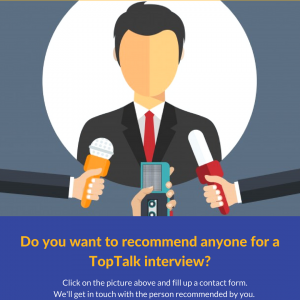 Steve Cadigan is a highly sought after talent advisor to leaders and organizations across the globe. As Founder of his own Silicon Valley-based firm, Cadigan Talent Ventures, Steve advises a wide range of domestic and international companies that include Twitter, Google, GoPro, The Royal Bank of Scotland, and the BBC. He is also regularly retained by some of Silicon Valley’s leading VC firms such as Andreessen Horowitz, Index Ventures, Sequoia, and Greylock Partners.
Steve Cadigan is a highly sought after talent advisor to leaders and organizations across the globe. As Founder of his own Silicon Valley-based firm, Cadigan Talent Ventures, Steve advises a wide range of domestic and international companies that include Twitter, Google, GoPro, The Royal Bank of Scotland, and the BBC. He is also regularly retained by some of Silicon Valley’s leading VC firms such as Andreessen Horowitz, Index Ventures, Sequoia, and Greylock Partners.
Steve also speaks regularly to conferences and Universities around the world and his amazing work in helping shape the unique culture at LinkedIn led Stanford University to build a graduate- level class around this ground-breaking work. Steve is frequently asked to appear on global TV and is a regular guest on Bloomberg West and CNBC. He is also a regular contributor to Forbes. Prior to launching his own firm, Steve worked as an HR executive for over 25 years at a wide range of companies and industries capped by serving as VP Talent at LinkedIn from 2009 through 2012, taking the company from a private firm of 400 employees, through an IPO and into the powerhouse that it is recognized as today.
Follow Steve on Linkedin http://www.linkedin.com/in/cadigan
Follow Steve on Twitter https://twitter.com/scadigan
Subscribe to Steve’s YouTube Channel https://www.youtube.com/channel/UCxG6IUPS2rQGSC9JLq_-eyQ
To know more about Steve’s media coverage, visit http://cadiganventures.com/news/
What does employee engagement mean to you?
A really interesting question because the more I think about employee engagement and what it really means, or whether that is a relevant topic to measure, the more I’m starting to feel like it’s not as important as it used to be. As you know, Gallup research came out recently with a study that revealed in North America, that engagement for professional workers is around 15-18% and that 65% of the population is not engaged. More significantly, particularly in the millennial generation, workers that actively disengaged numbers around 50%. I’m not really sure how relevant that is, is a measure anymore, because I don’t see anybody freaking out. I don’t see anyone particularly fearful or overly excited about that number being a massive concern, because if you really take it in, it’s a big problem. And what is particularly interesting is if you take a look at the reality today, how is it possible that more people are not engaged? How is it possible that we only have about 18% of the population engaged? Both candidates and companies have more information about each other than ever before. A candidate knows more about a company, the leadership, the culture, the compensation to make a good decision and companies know more about employees because of their social footprint. They know about their connections, they know how to do backdoor references. So in theory, people should have more information to make a better-informed decision about where to work than ever before.
How to Measure Employee Engagement?
A better measure today if we’re looking at trying to understand where the employee population is trust. Do you trust your leadership? Do you feel safe in your organization? Do you feel that you’re in a place where you’re protected and you can do your best work? I don’t know that engagement is the right measure anymore because we keep seeing these facts come out about how awful the numbers are, and nobody’s doing anything about it, that’s a concern. The other element that’s trending in the workforce right now is people just are not staying in companies as long as they used to. Turnover across the world is down. People are staying less and they’re moving faster. What does it mean to be engaged? What is the proper measure of your workforce? And obviously, success is the most important measure. Is your organization being successful and do people feel they’re inspired and they can do their best work? It’s really interesting. I don’t think we’ve ever seen a time in the workforce where more people are fearful and uncertain about the future than ever before. Things are changing fast. We hear about artificial intelligence and robots displacing jobs at a greater rate than ever before. This is a scary time. In terms of measuring engagement, like I said, I believe a better measure is going to be trusted. I believe a better measure is what I call an employee Net Promoter score. Would you recommend this company as a place to work? But I don’t think that there’s a ubiquitous engagement score that people are aiming for today. It’s really interesting.
What are the common causes of employee disengagement?
The biggest trends I’m seeing that are causing disengagement are that managers are too busy to have a really thoughtful, personal conversation with their employees. I think that the pace of business and the amount of information we’re expected to consume is impossibly larger, then we’re able to consume. That’s creating a big problem. I think you can’t turn your job off, if you have a cellphone, your job is always with you. And I think that’s causing increased dissatisfaction. We need to step back and help employees build boundaries. We need to be able to turn work off and be able to realize that sometimes doing more doesn’t always produce the best outcome. Sometimes doing less does and spending more time at work can have a negative effect on people’s burnout. There’s a lot of causes, there’s more data than people can possibly consume. Things are changing, and technology is changing faster than the human’s ability to absorb it, causing a general freak out. We’ve always had bad leadership, but we’re really suffering from an epidemic right now in terms of the belief people have in working for an organization. I think that people are much less loyal to a company today than they’ve ever been before, and they don’t buy any organization that says, oh, we’re going to promise you a five-year career plan. I don’t think anyone believes that today. Even if a company’s promising it, I don’t think anyone’s believing it.
What are the drivers of employee engagement in today’s fast-moving world?
Well, if you want to excite people and you want to attract people in your organization, the best thing you can do is offer an environment where they’re going to grow, where they’re going to learn in an uncertain world. What employees want is to know that regardless of what happens while I’m here, I’m going to learn, I’m going to grow. You will invest in me. I will develop. That is how you drive engagement. You don’t drive it by promising safety and security. You drive it by being authentic, by being real, and by helping people know that you are going to invest in their development more than anyone else. That’s so important today, more important than anything. I think you need to invest in in having a listening strategy, hearing what’s on people’s mind and trying to understand them and helping people navigate this crazy world that we’re working in right now.
What makes a really effective employee engagement program?
From my perspective, the most ineffective way to get people to be engaged is to have an engagement program. I’ve never seen an engagement program work, and if an engagement program comes from human resources, it’s even less likely to be successful. How you drive engagement is by having a comprehensive listening strategy, by being authentic, by making things transparent. Talk to them about everything that’s working well, things that aren’t working well and be honest. That’s not a program being honest is something that needs to happen all the time. Explain your decisions, share the downsides with them. Listen to them, ask them, how are you doing? What can we do to make you more productive and build that relationship of trust? That’s how you drive engagement. There’s no program that’s ever going to solve that. You can’t fake. You can’t have a program to build trust. Trust takes time. And by the way, people who you have had harder times what with have the more loyalty in the end because see what you’re made of. And those are really, really great opportunities.
►►Subscribe here to learn more https://www.youtube.com/channel/UCjkg…
Find us on Facebook: https://www.facebook.com/grosum.10/
Follow us on Twitter: https://twitter.com/GroSums
Connect with us on Linkedin: https://www.linkedin.com/company/grosum/
Listen to our podcasts on SoundCloud: https://soundcloud.com/grosum
Read more on our blog: https://grosum.com/blog/
To see more industry leaders on performance management, employee engagement & company culture log on to GroSum Top Talk. https://grosum.com/topTalk/
Keep in touch at GroSum for Performance Management, Feedback and improving employee engagement and performance. https://www.grosum.com/i/#
